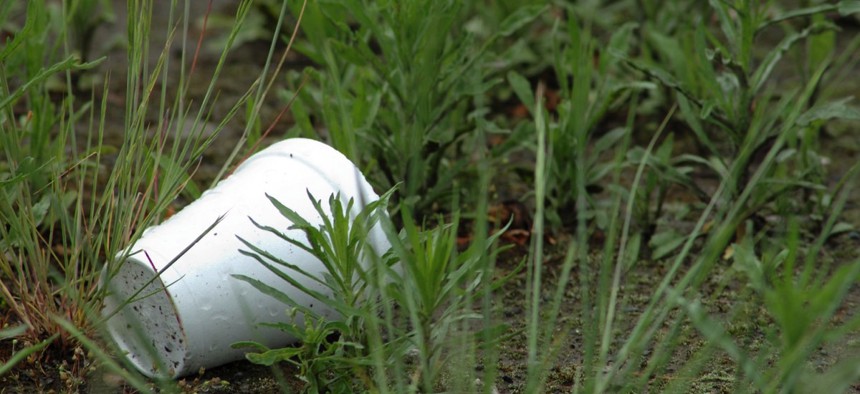Maryland Races to Be First State to Ban Foam Containers and Cups

Shutterstock
The clock is ticking on a compromise bill that either Gov. Larry Hogan will sign or both chambers might pass with veto-proof majorities.
Maryland is poised to become the first state to ban foam food containers and cups after separate bills passed the Senate and the House of Delegates with veto-proof majorities.
Both bills would end school and business use of polystyrene in its foam form—commonly referred to by the brand name Styrofoam—in cups and food containers and have counties fine violators up to $250. Plastic cups, like the red Solo cups, are made from polystyrene in its solid form and are not affected by the legislation, and neither is block foam used in packaging.
The House passed its bill Tuesday by a vote of 97 to 38, while the Senate version passed earlier in March 34 to 13.
Proponents argue foam products pollute communities and their waterways, and unlike other substances, they break apart easily making cleanup tougher.
“Single-use plastics have become ubiquitous in our lives, and they are litter in the streets, litter in the bay,” Del. Brooke Lierman, a Baltimore Democrat and the House bill’s sponsor, told The Frederick News-Post.
Both legislative chambers must now work out differences in the bills in conference before a fast-approaching “Crossover Day” on March 18, when each side sends the other legislation expected to pass.
The advocacy group Trash Free Maryland has worked with the bills’ sponsors—Lierman and Sen. Cheryl Kagan, a Montgomery County Democrat—the past three years to get something passed. Ashley Van Stone, executive director of the organization, told Route Fifty they will consider the different amendments on each bill before finalizing legislation.
“Its passage demonstrates leadership and understanding in addressing the trash pollution issues impacting Maryland, as well as what we’re seeing all over the country and the globe,” Van Stone said.
Whether Gov. Larry Hogan, a Republican, will sign off on the final legislation or if it still has veto-proof majorities in both chambers remains to be seen.
“We certainly don’t want to make any assumptions,” Van Stone said.
The bills are in keeping with the governor’s waste reduction and resource recovery goals, she added. Hogan’s office did not respond to a request for comment.
Among the opponents to the legislation is the Maryland Retailers Association, which prefers recycling and education programs to an outright foam ban.
Since China stopped importing polystyrene, it has the highest recyclable yield on the market—a potential revenue source for local governments, said Cailey Locklair Tolle, president of MRA.
But Van Stone said that recycling the foam material isn’t so easy. Not all recycling receptacles around Maryland accept food-service foam because it’s contaminated and must be cleaned first, but she added that recycling block foam could succeed with the right planning and investment.
Food-service foam is only 0.6 percent of the total waste stream and is 90 percent air, while other recyclables weigh more—increasing tipping fees, Locklair Tolle said.
“I think [polystyrene gets a bad name] because it’s light, and when people choose to litter the product you see it,” Locklair Tolle said. “It’s very visible; it’s white.”
Misconceptions also exist like polystyrene absorbs more toxins than other single-use products, she added.
MRA plans to talk to the governor about vetoing final legislation, but that won’t “make sense” if it emerges with veto-proof majorities in both chambers, Locklair Tolle said.
Meanwhile, Trash Free Maryland members are in conversations about what pollution legislation the organization might push next, Van Stone said.
“There are a number of states this year—more than normal—that have introduced plastic bottle bills,” she said. “Plastic bags and bottles are up there for sure.”
Dave Nyczepir is a News Editor at Route Fifty and is based in Washington, D.C.
NEXT STORY: Americans Are Going Bankrupt From Getting Sick






